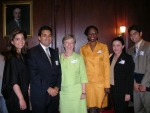Justice In Profile
Graciela Dixon
 Chief Justice Graciela Dixon is the first woman of African
descent to serve as Panama’s chief justice and is
one of only a few women in the world serving in this type
of position.
Chief Justice Graciela Dixon is the first woman of African
descent to serve as Panama’s chief justice and is
one of only a few women in the world serving in this type
of position.
In a country where many afro-descendant women are frequently caught in the circle of poverty and exclusion, Dixon has been an agent of change, dedicated to the pursuit of gender and racial equality for both the residents of Panama and people throughout the world.
The Chief Justice has been active in international legal organizations and international human rights, particularly in Central America, and is the Vice President for the Latin America Federation of Magistrates (FLAM) and President of the International Association of Women Judges. She has spoken on the importance of judicial networking, especially for women, and has highlighted Panama’s work toward integrating gendered perspectives into its courts.
|
Dixon graduated with a bachelor’s degree in Law and Political Science from the University of Panama in 1973 and later received her post-graduate degree in Human Rights from the University of Santa Maria La Antigua University in Panama. Her additional studies have included receiving specialized judicial education with the Training Program for Court Judges and Magistrates at the General Counsel of the Judicial Branch in Barcelona, Spain, and training in constitutional law at the Carlos III University in Madrid, Spain.
Some of her professional accomplishments include: from 1988 to 1992, she was a legal representative for the victims of US military intervention in Panama; in 1995, she was a national consultant to UNICEF’s Technical Committee for the Implementation of Family Code for the Republic of Panama; and in 1996, she was an international delegate for the International Women’s Organization during the Presidential elections in Nicaragua.
For more than 22 years, Dixon practiced as a litigation attorney before being elected in 2005 as Chief Justice of the Supreme Court of Panama, making her the third woman magistrate to be elected to the position. Since then, her goals have been to improve the court’s efficiency, transparency, and capacity.
Throughout her political and human rights career, she has been a vocal advocate on the role of judges: “Judges have the great and sensitive task of building peace in each of our rulings. Judges are one of the most important beings on earth because we have great responsibility-if we accept it. I think I am blessed to be able to take on these responsibilities.”
In 2005, the Organization of American States and the United Nations designated Dixon to be the Observer in the instauration process of the Supreme Court of Justice of Ecuador.
For her performance as chief justice and her role in the international community, Dixon was recently presented an award for professional excellence by New York State Chief Judge Judith S. Kaye at a reception at Brooklyn Law School in May 2007.[1]
After having 22 years of experience in litigation, 10 years of service on the Supreme Court of Panama, and numerous accolades bestowed upon her, Dixon’s energy is far from deplete and has indicated possible future plans for creating a consulting group.
Dixon is married to cattleman Humberto Cerrud and has one daughter, Graciela Libertad who is now in medical school.
Veronica M. Onorevole, Co-Editor of the International Judicial Monitor, Program Associate of the American Society of International Law.
[1] Source: www.brooklyneagle.com.

